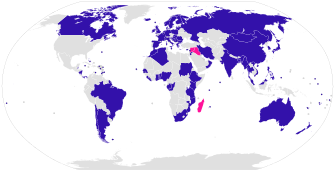
Back Seearbeitsübereinkommen German کنوانسیون کار دریایی Persian Convenzione internazionale sul lavoro marittimo Italian Maritiem Arbeidsverdrag Dutch Конвенция о труде в морском судоходстве Russian Конвенція про морську працю Ukrainian 海事劳工公约 Chinese
| Maritime Labour Convention | |
|---|---|
 | |
| Drafted | 7 February 2006 |
| Signed | 23 February 2006 |
| Location | Geneva |
| Effective | 20 August 2013[1] |
| Condition | 30 ratifications; representing 33% of gross tonnage of ships |
| Parties | 108[2] |
| Depositary | Director-General of the International Labour Organization |
| Languages | French and English |
| Full text | |
| Admiralty law |
|---|
| History |
| Features |
| Contract of carriage/Charterparty |
| Parties |
| Judiciaries |
| International conventions |
| International organizations |
The Maritime Labour Convention (MLC) is an International Labour Organization (ILO) convention, number 186, established in 2006 as the fourth pillar of international maritime law and embodies "all up-to-date standards of existing international maritime labour Conventions and Recommendations, as well as the fundamental principles to be found in other international labour Conventions".[3] The other pillars are the SOLAS, STCW and MARPOL. The treaties applies to all ships entering the harbours of parties to the treaty (port states), as well as to all ships flying the flag of state party (flag states, as of 2021: over 97 per cent).
Maritime Labour Convention (MLC), according to International Labour Organization, provides a broad perspective to the seafarer's rights and fortification at work.[4]
The convention entered into force on 20 August 2013, one year after registering 30 ratifications of countries representing over 33 per cent of the world gross tonnage of ships.[1] Already after five ratifications the ratifying countries (Bahamas, Norway, Liberia, Marshall Islands, and Panama) represented over 43 per cent of the gross world tonnage[5] (which is over 33 per cent; the second requirement for entry into force). As of August 2021, the convention has been ratified by 97[2] states representing over 97 per cent of global shipping.
Although the convention has not been ratified worldwide, it has widespread effect because vessels from non-signatory states that attempt to enter ports of signatory states may face arrest and penalties for non-compliance with the MLC.
- ^ a b "Philippines ratification marks global milestone for decent work for seafarers". ILO. 20 August 2012. Retrieved 21 August 2012.
- ^ a b "Ratifications of ILO conventions: Ratifications by Convention". www.ilo.org. Retrieved 28 October 2019.
- ^ Cite error: The named reference
treatywas invoked but never defined (see the help page). - ^ Global, Amity Marine (9 August 2019). "A Guide to Maritime Labour Convention (MLC), 2006 for Maritime Professionals".
- ^ "Panama and Norway ratify Maritime Labour Convention". worldmaritimenews.com. 12 February 2009. Retrieved 30 October 2010.
Together the five flags represent 43-cent of the world's shipping tonnage.